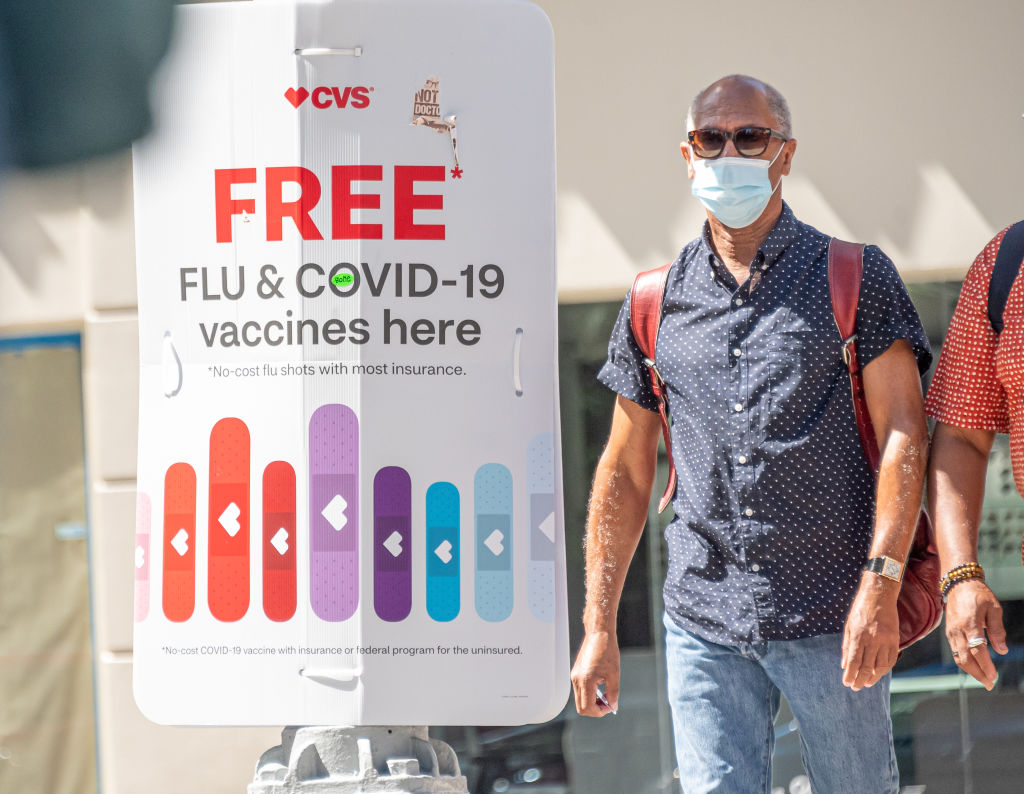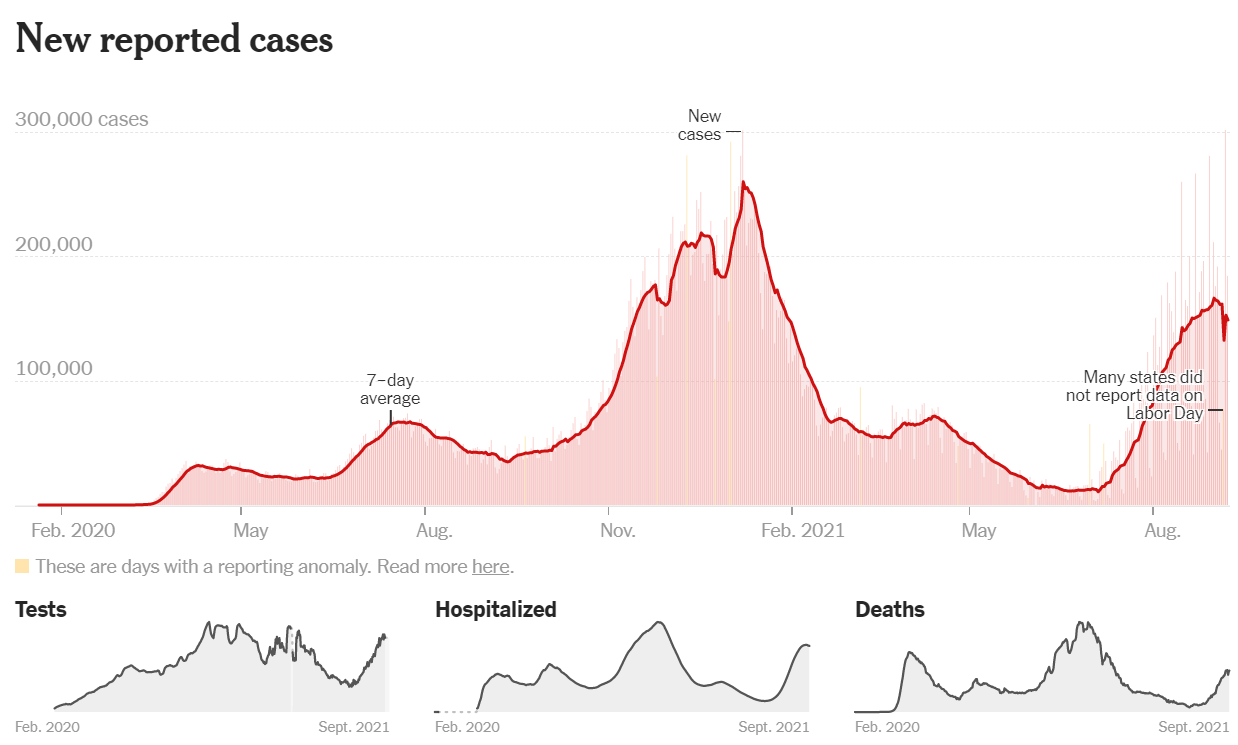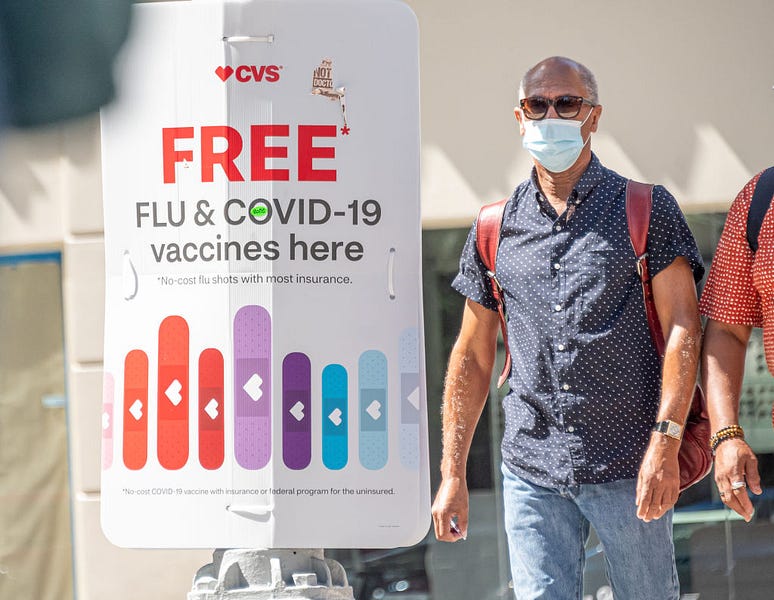Happy Thursday! Blue’s Clues turning 25 yesterday made the younger Morning Dispatchers feel really old and the older Morning Dispatchers feel, well … you know.
Quick Hits: Today’s Top Stories
-
Police in Hong Kong arrested four members of the group that organizes an annual vigil commemorating the Tiananmen Square massacre, accusing them of not cooperating with an investigation into allegations they are acting as foreign agents.
-
Former Afghan President Ashraf Ghani released a statement Wednesday apologizing to the Afghan people for not being able to avert the republic’s demise and claiming he believed his abrupt fleeing of the country on August 15 was “the only way to keep the guns silent and save Kabul and her 6 million citizens.”
-
The Louisiana Department of Health said yesterday that Hurricane Ida’s death toll in the state has risen to 26, with nearly a dozen additional people succumbing to carbon monoxide poisoning or excessive heat due to extended power outages. About 300,000 customers in Louisiana remained without power as of Wednesday night.
-
The Biden administration has ousted 18 former Trump administration officials who had been appointed to military service academy advisory boards, including former National Security Adviser H.R. McMaster, former counselor Kellyanne Conway, former press secretary Sean Spicer, and former Office of Management and Budget director Russ Vought. White House press secretary Jen Psaki told reporters, “the president’s qualification requirements are … whether you’re qualified to serve and whether you’re aligned with the values of this administration.”
-
The Supreme Court on Wednesday night delayed the execution of Texas death row inmate John Henry Ramirez. Lawyers for Ramirez, convicted of killing a convenience store worker in a robbery in 2004, claimed his First Amendment rights had been violated because Texas would not allow his pastor to lay hands on him during his execution by lethal injection.
When Will We Shift to the Endemic Phase of COVID?

Remember when we beat the coronavirus? Three months ago, it looked like the COVID-19 pandemic that had battered the world for more than a year might soon be a thing of the past. The vaccines were going into arms as fast as the manufacturers could ship them and beating case counts into the ground. The primary conversations happening around the virus—especially in conservative circles—were cheerful ones about whether blue states addicted to pandemic power would keep clinging to their states of emergency long after the major threat had passed.
Then, Delta. The spike in cases and hospitalizations the Southeast has seen in recent weeks wasn’t as bad as the one we had over the winter, but it dwarfed the numbers from last summer’s pre-vaccine surge—a result of the variant’s transmissibility and the decision by millions of people to resume living as if the pandemic was over without actually punching their vaccine ticket first. More than 100,000 Americans are currently hospitalized with the virus, and we’re back to averaging 1,500 deaths a day. While the surge in states like Florida seems at last to be leveling off, cases are rising significantly again in other regions, particularly the Midwest.

(Source: the New York Times)
President Joe Biden, who for months has been cajoling the public to get the vaccine, plans to deliver a major speech today about his administration’s plan to tackle the next phase of the pandemic. Aides promise a “six-pronged strategy … working across the public and private sectors.” But barring something truly striking such as the administration trying to mandate vaccines itself—something Biden himself has previously and correctly said he does not have the power to do—it’s likely this latest effort will simply amount to more cajoling of other private and public entities to ramp up the vaccine pressure in their own spheres of influence.
Nothing Biden can say or do will change what has long been the single baseline fact about COVID in America: We can’t agree about what stage of the pandemic we’re actually in.
There are, of course, plenty of cranks out there who maintain there never really was a pandemic; that all this sound and fury was a spun-up plot to use a largely harmless virus to increase state control over peoples’ lives. But the far more common conservative position is simply that the drawbacks of the public health measures taken across the country over the past year have outweighed the benefits, and continue to outweigh the benefits the longer they’re carried on. Such people have long since decided, in other words, that COVID-19 is no longer pandemic—an uncontrollably spreading disease demanding a total war policy response. Rather, they’ve begun to think of the disease as endemic—a significant threat, perhaps, but one among many in life, and one that we’re going to have to learn to deal with.
In many communities, that pivot has been premature at best, and disastrously miscalculated insofar as it depressed vaccination rates—leading to thousands and thousands of deaths, overcrowded hospitals, and other preventable ills. But with the third year of COVID-19 not far off and vaccination rates continuing to creep up—and the vaccines continuing to provide strong protection against serious illness and death—it’s fair to wonder when it will become appropriate to treat the disease as endemic, what level of risk it is prudent to tolerate, and, just as importantly, whether there’s any hope of ever reaching anything resembling social consensus on that question.
“I think there is still some mystical idea that we are going to eliminate [the virus]. We’re not,” Dr. Monica Gandhi, an infectious disease specialist at the University of California San Francisco, told The Dispatch. “That shift in our minds to endemic is when we can accept that we’re going to get to an endgame, because we won’t get to an endgame if we decide that we want to eliminate it.”
The biggest factor in any individual’s COVID risk remains whether or not they’re vaccinated. “In Seattle on an average recent day, about one out of every one million vaccinated residents have been admitted to a hospital with COVID symptoms,” David Leonhardt wrote in the New York Timesthis week. “That risk is so close to zero that the human mind can’t easily process it.”
The best-case scenario, then, probably looks something like this: As Delta hotspots continue to break out explosively in areas with low vaccination rates, that drives some people to revise their endemic calculations and get vaccinated. Meanwhile, states start to agree on standards for recommended levels of anti-pandemic measures pegged to certain levels of hospitalizations for the virus. And states continue to build out their infrastructure for tracking the population-level course of the disease, including at-home rapid tests and bird’s-eye projects like wastewater surveillance, allowing communities to react to small viral surges before they get really out of hand.
“We need to be deploying the kinds of things that are going to both help us get this under control and allow us to have a safer management of COVID that permits more normal societal interactions,” Dr. Samuel Scarpino, managing director of the Rockefeller Foundation’s Pandemic Prevention Institute, told The Dispatch. Ideally, steps like this would take much of the burden of tracking the disease and making constant cost-benefit analyses off the shoulders of a burned-out populace: “If we’re successful in this, the outcome is more like taking an umbrella with you when you go to work.”
The grim reality is that regardless of how successful efforts like these are, we’re likely to reach some level of endemic consensus before too long. For those who are vaccinated but remain deeply afraid of the virus, upcoming milestones like FDA-approved vaccinations for younger children will help to defray some of that residual angst. And for populations who choose to forgo the vaccine, the transmissibility of the Delta variant is such that immunity of another sort won’t be long in coming either.
“Fundamentally, Delta will be in a way its own endgame,” Dr. Gandhi said. “Look at what happened in India, 4 percent vaccination rate—terrible, terrible suffering, awfulness. I have many relatives in India—they’re open. COVID is still there … but it is not influencing their day-to-day anymore. And that was a terrible way to get to an endgame. But that is what will happen in the United States—it is happening as we speak. … It does not mean that any doctor would ever want to get to natural immunity, but it is happening. Why are the cases going down in the South? They didn’t close bars and restaurants; they didn’t put mask mandates in; they didn’t put vaccine mandates in. The cases are going down in Missouri and Mississippi and Indiana because it’s burning through the population.”
Virginia Gubernatorial Race Heats Up
Most political junkies’ eyes have understandably been out West of late, as we’re now just a few days away from knowing whether Gov. Gavin Newsom will survive his recall election. But California is not the only state with a gubernatorial race this fall. In a few short weeks, Virginians will go to the polls to either send Democrat Terry McAuliffe back to the executive mansion or elect Republican newcomer Glenn Youngkin. (Early voting begins next Friday.) In a piece for the site today, Audrey Fahlberg—officially back from her summer at the Wall Street Journal—details how the campaign is shaping up.
What’s the state of the race right now?
Virginia voters backed the Republican nominee in every presidential election from 1968 to 2008, when Barack Obama flipped the state. It’s since trended bluer: Trump lost the Old Dominion by 10 points in November, and the state’s sitting governor, lieutenant governor, and attorney general are all Democrats.
Polling suggests the race leans in McAuliffe’s favor but is still close. A Christopher Newport University survey of likely voters from August 15-23 gives McAuliffe a 9-point lead over Youngkin, and a Roanoke College poll conducted August 3-17 puts McAuliffe 8 points ahead.
What are the biggest differences between the campaigns?
McAuliffe says he plans to raise the minimum wage from $8.75 to $15 an hour, ban assault weapons, and act as a “brick wall” against the pro-life movement. He isn’t keen on answering questions about critical race theory, which has rattled many parents in Loudoun County, Virginia’s wealthiest county and ground zero for the state’s debate on the issue.
McAuliffe also takes a much more progressive approach to pandemic policy than his opponent. He has required his campaign staff to be vaccinated and promises to mandate COVID-19 vaccines for all K-12 students, staff, and faculty if elected. Youngkin, meanwhile, said last week that he will not allow pandemic lockdowns in Virginia ever again if he becomes governor.
He says he will ban the teaching of critical race theory in public schools and has vowed to protect qualified immunity, the legal doctrine that protects police officers from being sued unless the rights in question violate a “clearly established” law. On economic matters, he’s a classic business conservative, endorsing a “day one” tax plan that would, among other things, eliminate Virginia’s grocery tax and provide a one-time tax rebate of $600 for joint filers and $300 for individuals.
Is Youngkin more of a traditional conservative or Trump-style Republican?
Youngkin’s challenge is to present a Republican platform that’s palatable to moderates and independents—especially those who live in the state’s increasingly blue Northern Virginia suburbs—while also appealing to GOP voters who still identify with Trump.
“I was talking to one of my Republican friends a month ago and he said basically, what Youngkin needs to do is he needs to get the Trump turnout in the rural areas, but he needs to perform like Romney in the suburban areas,” J. Miles Coleman, an assistant editor at Sabato’s Crystal Ball at the University of Virginia’s Center for Politics, told The Dispatch. “But, you know, each election is a different event. So you can’t just take the best parts of each coalition.”
The Trump-endorsed candidate avoids even mentioning the former president’s name at campaign events. This strategy won him the nomination, but some voters wonder whether his eagerness to distance himself from Trump has led him to conceal his real policy ambitions on contentious issues. Youngkin’s views on gun control, for example, are so vague that the NRA declined to endorse his candidacy, even though the organization endorsed Winsome Sears, the GOP’s nominee for lieutenant governor, and Jason Miyares, the party’s candidate for attorney general.
Worth Your Time
-
John Mulaney may have gotten most of the comedian headlines yesterday after announcing he and his new partner—actress Olivia Munn—are expecting their first child together, but Tim Alberta has a wonderful story in The Atlantic about Nate Bargatze, the “nicest man” in stand-up (whom one of your Morning Dispatchers is very excited to see in D.C. later this month). “If comedy is a proxy for the mood of American society, Bargatze’s sudden popularity suggests that he’s tapped into something powerful: the discontent with our discontent,” Alberta writes. “He insists that stand-up can be a great unifier, bridging the divides that have emerged within families, among friends, between red states and blue states. ‘People are worn out,’ he told me. ‘It seems like every form of entertainment these days has to have a message, and it’s gotten old.’”
-
Mike Piazza hit a home run on September 21, 2001, that put the New York Mets up 3-2 on the Atlanta Braves during the first regular-season sporting event in New York City after the 9/11 attacks. For ESPN, Ryan Hockensmith remembers the importance of that game—and that moment. “On the way to Shea Stadium, Mike Piazza spent the whole ride thinking it was too soon,” he writes. “The Mets had swept three games in Pittsburgh from Sept. 17-19, and Piazza struggled badly. Not on the field—he had two home runs and four RBIs against the Pirates. But inside, he felt empty. He’d grown to love New York, being a New Yorker, being a Met. He wasn’t sure how he or his teammates would possibly be able to play with the destruction just a few miles away. It didn’t feel right. … ‘We just didn’t know if we should be there,’ he says. ‘To be a professional athlete, you do have to muster up a certain sense of emotion to play with intensity. And at that point, all of our emotion was drained.’”
Presented Without Comment
Also Presented Without Comment
Toeing the Company Line
-
In this week’s Capitolism(🔒), Scott Lincicome took a look at the housing market, arguing that populists on the left and right are blaming the wrong bogeyman for soaring costs. “The way to fix the nation’s current housing problems isn’t by taxing hedge funds,” he argues. “It’s by deregulating local housing markets and making it quicker and easier for builders to build—especially in popular markets.”
-
Jonah brought the fire in Wednesday’s G-File (🔒). “The reigning Brahmins of our foreign policy keep talking about how more than 100 nations ‘expect’ the Taliban to do this or that,” he writes. “How have the expectations of the international community changed North Korea’s behavior? Or Iran’s? Or Russia’s? Remember all of the jaw-jawing of Bashar Assad? … No one in the Taliban leadership has been living in the mountains, crapping in caves without the benefit of first world toilet paper, and letting their sons vaporize themselves so they can get reserved tickets to hear Larry Summers’ presentation at Davos.”
-
On yesterday’s Dispatch Podcast, Sarah, Steve, Jonah, and Chris discuss the Taliban’s new government in Afghanistan, whether Joe Biden will be able to recover from his tumultuous summer, Donald Trump and the 2024 GOP field, and the September 11 attacks 20 years later.
Let Us Know
We’ve finally made it: After seven long months, a real-life NFL game between the Tampa Bay Buccaneers and Dallas Cowboys is being played tonight. Before the season starts, who is your pick to win the Super Bowl next February?
Reporting by Declan Garvey (@declanpgarvey), Andrew Egger (@EggerDC), Charlotte Lawson (@charlotteUVA), Ryan Brown (@RyanP_Brown), Harvest Prude (@HarvestPrude), and Steve Hayes (@stephenfhayes).






Please note that we at The Dispatch hold ourselves, our work, and our commenters to a higher standard than other places on the internet. We welcome comments that foster genuine debate or discussion—including comments critical of us or our work—but responses that include ad hominem attacks on fellow Dispatch members or are intended to stoke fear and anger may be moderated.
You are currently using a limited time guest pass and do not have access to commenting. Consider subscribing to join the conversation.
With your membership, you only have the ability to comment on The Morning Dispatch articles. Consider upgrading to join the conversation everywhere.